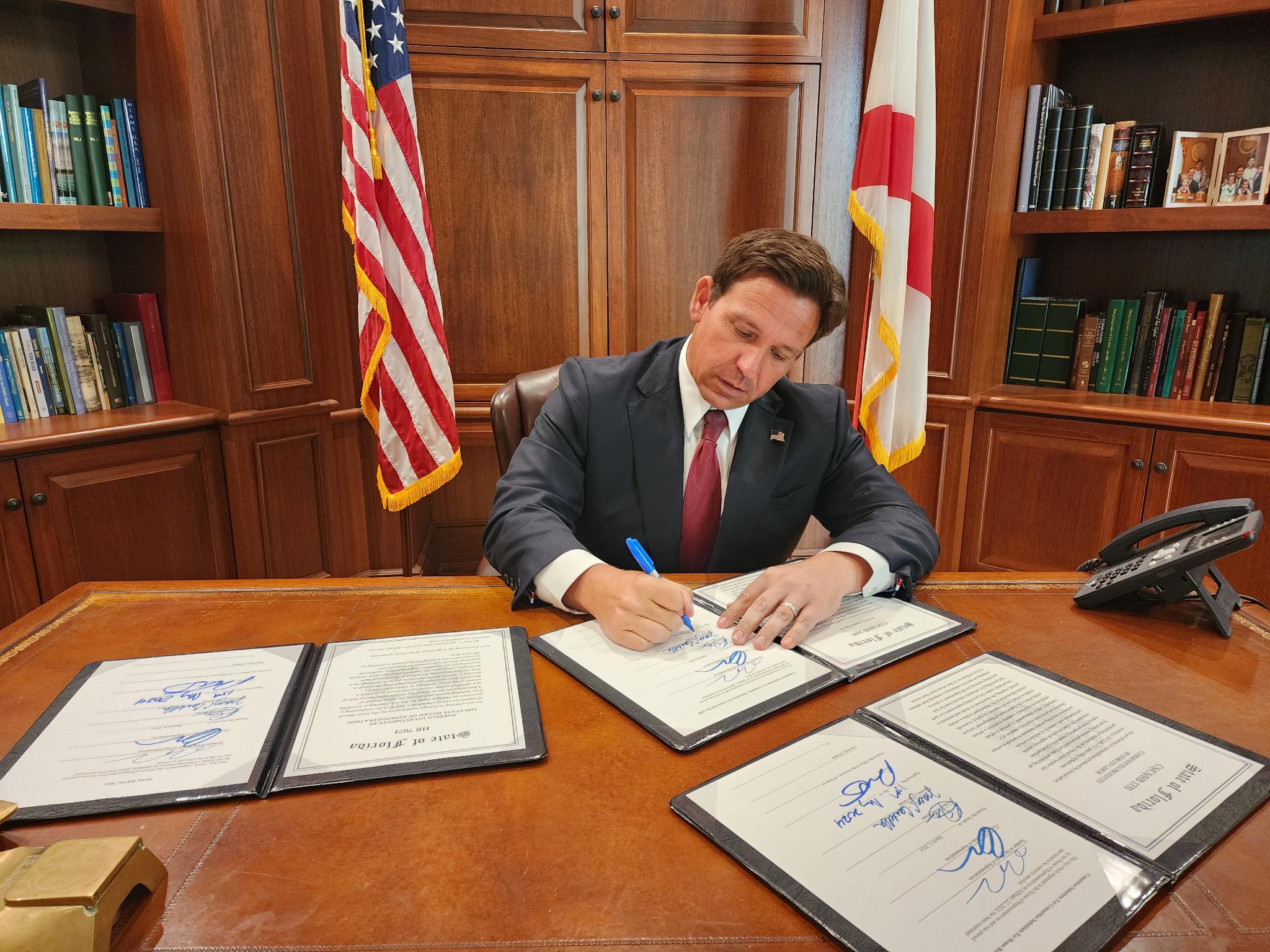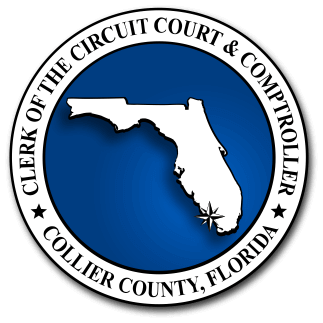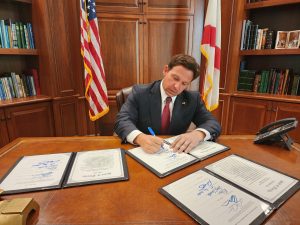 Since the start of the year, Governor Ron DeSantis has signed over 180 bills from the 2024 Legislative Session into law that went into effect on July 1, 2024. Some notable laws include allowing patriotic organizations in schools, HOA fine limits and transparency, and changes in eviction laws. In addition to these, 34 new laws have been set into effect starting October 1, 2024. These laws range from fiscal policies, governmental oversight and accountability, judiciary, regulated industries, vehicles, and more.
Since the start of the year, Governor Ron DeSantis has signed over 180 bills from the 2024 Legislative Session into law that went into effect on July 1, 2024. Some notable laws include allowing patriotic organizations in schools, HOA fine limits and transparency, and changes in eviction laws. In addition to these, 34 new laws have been set into effect starting October 1, 2024. These laws range from fiscal policies, governmental oversight and accountability, judiciary, regulated industries, vehicles, and more.
Here are ten new Florida Laws related to the Courts and our services:
- HB 341 — Designation of Certain Diagnosis on Motor Vehicle Registrations
Cited as the “Safeguarding American Families Everywhere” (SAFE) Act, this law provides that the application form for motor vehicle registrations must include language allowing an applicant to voluntarily indicate that the applicant has been diagnosed with, or is the parent or legal guardian of a child or ward who has been diagnosed with, certain disabilities or disorders by a physician, including:
- Autism
- Attention Deficit Hyperactivity Disorder (ADHD)
- Down Syndrome
- Alzheimer’s disease
- Traumatic brain injury
- Posttraumatic Stress Disorder (PTSD)
- Diabetes
- Autoimmune Disorder
- Deafness
- Blindness
- Any other mentally or physically limiting disorder
The department may not include in the motor vehicle record personal identifying information of, or any diagnosis of, a person for whom a diagnosis is indicated.
- HB 403 — Specialty License Plates
The bill authorizes the Department of Highway Safety and Motor Vehicles (DHSMV) to create the following new specialty license plates:
- Margaritaville
- General Aviation
- Clearwater Marine Aquarium
- United Service Organizations (USO)
- Recycle Florida
- Boating Capital of the World
- Cure Diabetes
- Project Addiction: Reversing the Stigma
- The Villages: May All Your Dreams Come True
- HB 801 — Alzheimer’s Disease and Related Dementia Training for Law Enforcement Officers
The Florida Department of Law Enforcement, in consultation with the Department of Elder Affairs, must establish online training. Such training must include, but is not limited to instruction on interacting with persons with Alzheimer’s disease or a related form of dementia, including:
- Instruction on techniques for recognizing behavioral symptoms and characteristics;
- Effective communication;
- Employing the use of alternatives to physical restraints; and
- Identifying signs of abuse, neglect, or exploitation.
- HB 1049 — Flood Disclosure in the Sale of Real Property
The seller of any residential real property is required to furnish to the buyer, at or before signing the contract for purchase of the property, a disclosure form regarding flood risks. The form informs the buyer that homeowners’ insurance does not cover flood damage and encourages the buyer to inquire about flood insurance.
- HB 1171 — Schemes to Defraud
A scheme to defraud is a systematic, ongoing course of conduct with intent to defraud one or more persons, or with intent to obtain property from one or more persons by false or fraudulent pretenses, representations, endorsements of nonconsenting parties, or promises or willful misrepresentations of a future act.
The penalty for committing the offense of scheme to defraud against a person 65 years of age or older, against a minor, or against a person with a mental or physical disability, is as follows:
- A first degree misdemeanor is reclassified to a third degree felony;
- A third degree felony is reclassified to a second degree felony;
- A second degree felony is reclassified to a first degree felony; and
- A first degree felony is reclassified to a life felony.
The bill adds “endorsements of nonconsenting parties” to the definition of “scheme to defraud.”
- HB 1235 — Sexual Predators and Sexual Offenders
Includes amendments to Florida’s Sexual Predators Act and state statutes regarding sexual offenders, such as:
- Require sexual predators and sexual offenders to register all changes in vehicles owned.
- Require sexual predators and sexual offenders to respond to any address verification correspondence from the FDLE or from county or local law enforcement agencies within three weeks after the date of the correspondence, rather than only from the FDLE.
- Specify that each instance of failure to register or report changes to the required information specified constitutes a separate offense.
- SB 86 — Hope Cards for Persons Issued Orders of Protection
Requires the Clerks of the Court to create the Hope Card program for persons issued an injunction for protection against domestic violence; repeat violence, dating violence, and sexual violence; stalking and cyberstalking; or exploitation of a vulnerable adult. Under the program, the Clerks will issue Hope Cards, which identify and describe the person who is restrained by an order of protection, identify those protected by the order, and provide the telephone number for the statewide domestic violence hotline.
- SB 764 — Retention of Sexual Offense Evidence
Specifies parameters for the storage of sexual assault evidence kits (SAKs). Kits that are collected from an alleged victim of a sexual offense who does not report the sexual offense to law enforcement during the forensic physical examination and does not request to have the evidence tested, must be retained for a minimum of 50 years.
The bill requires that:
- The medical facility or certified rape crisis center that collected the kit must transfer the SAK to the Florida Department of Law Enforcement (FDLE) within 30 days after the collection date; and
- The FDLE must store the evidence anonymously, in a secure environmentally safe manner, and with a documented chain of custody.
- SB 1628 — Local Government Actions
A local government must generally, with certain exceptions, complete a business impact estimate, which includes an estimate of the direct economic impact of the government action, before passing an ordinance. The bill provides that local governments must complete a business impact statement prior to adopting and implementing a comprehensive plan amendment or land development regulation amendment, other than those amendments initiated by a private party.
- Public Records Exemptions
The Open Government Sunset Review Act requires the Legislature to review each public record exemption and each public meeting exemption five years after enactment. If the Legislature does not reenact the exemption, it automatically repeals on October 2nd of the fifth year after enactment.
These bills save from repeal the public record exemption from different categories:
- HB 7001 —Reporter of Child Abuse, Abandonment, or Neglect
- HB 7003 —Preregistered Voters
- HB 7005 —Financial Disclosure
- HB 7007 —Campus Emergency Response
- HB 7043 —Agency Personnel Information
- SB 7006 —Utility Owned or Operated by a Unit of Local Government
- SB 7008 —Department of the Lottery
The complete list of 2024 Bills and their summaries can be accessed at www.flsenate.gov/Committees/BillSummaries/2024/.

